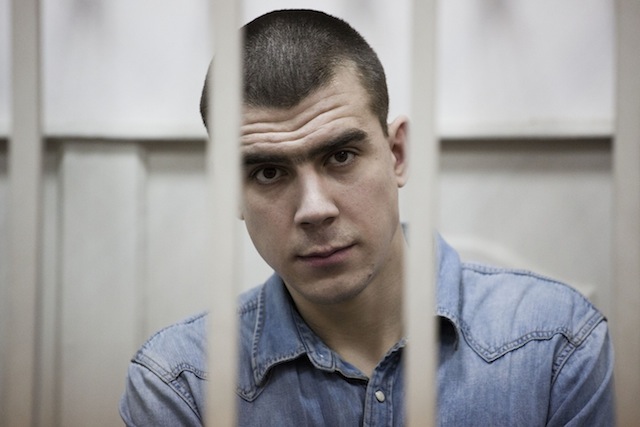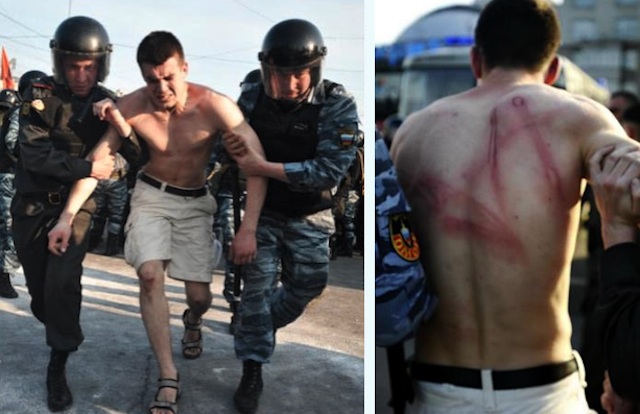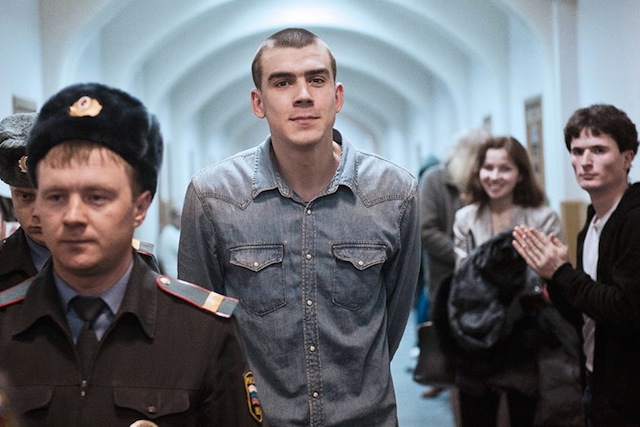The Institute of Modern Russia continues its series of publications on Russia’s political prisoners with a profile of Denis Lutskevich: student, former marine, and “Bolotnaya case” defendant. Today, April 11th, he turned 22.

Name: Denis Alexandrovich Lutskevich
Date of birth: April 11, 1992
Arrested on June 9, 2012, sentenced to 3 years and 6 months in a general regime penal colony on February 24, 2014.
Like many defendants of the Bolotnaya case, Denis Lutskevich went to the protest on May 6, 2012, with no specific purpose. It was his first protest, and he joined a group of fellow students and professors from the State Academic University for the Humanities. Before the Bolotnaya Square protest, the largest mass event he participated in was the Red Square parade in 2011. At the time, Denis served as a marine with the 336th Guards Brigade of the Baltic Fleet Coastal Forces.
It was by chance that Lutskevich ended up in a group of protesters who were being forced from the street by OMON (special purpose police unit) officers. When the crowd decided to breach the police cordons, someone tore off Denis’ shirt, leaving him half-naked, wearing only shorts and sandals. Journalist Dmitry Borko pointed out that, in a way, this incident sealed his fate because investigation officers easily noticed the tall, half-naked young man on street camera footage. As many witnesses later testified, in the chaos of the clashes between the protesters and the police, officers overpowered Lutskevich and other protesters and dragged him to a police van.
Lutskevich turned out to be in the same police van as editor of the Russian Esquire, Dmitry Tkachyov who remembered Denis and later wrote that his back “was covered with bruises from the [police] batons. He tried to sit [straight] so that his back would not touch the side of the van; apparently, he was in a lot of pain.”

At the police station Denis, along with other detainees, was questioned from 9:30 pm until 4:30 am the next morning. He was released; however, he needed urgent medical care. Lutskevich was transported by ambulance to the Sklifosovsky Research Institute of Emergency Care. During medical examination, doctors found that he developed a concussion of the occipital lobe, a hematoma on the right earflap, and multiple bruises on his back and hands.
The Yakimanka district court, where Lutskevich’s case was transferred soon after these events, dismissed the case against him. In particular, the judge ruled that “the protocol on administrative offense contains signs of falsifications, namely, that the signatures of the police officers in the protocol differ from the signatures of the same officers in the police report.”
Denis Lutskevich: “I saw with my own eyes the tragic depth of the crisis of Russian authority. Becoming a defendant, I felt first-hand the powerlessness of an ordinary Russian citizen and the monstrous soullessness [of the state machine].”
It seemed that the incident was over. However, it turned out to be a prelude to the chain of dramatic, and sometimes absurd, events that followed. On June 9, 2012, officers of the Russian Investigative Committee suddenly showed up at Lutskevich’s apartment with a search warrant. Denis was arrested, and a week later, he was officially charged with “participation in mass riots” (Article 212, part 2 of the Russian Criminal Code) and “use of force against a representative of the authorities” (Article 318, part 1 of the Criminal Code). According to the investigation, Lutskevich allegedly threw stones at the police and tore off an OMON officer’s helmet. Such charges carry a maximum sentence of up to 13 years of imprisonment.
It is important to note that, right after the Bolotnaya Square protest, Dmitry Peskov, a spokesperson for the Russian President, viciously stated that, “for an injured OMON officer, the protesters’ livers should be spread over the pavement.” Later, at his annual press conference, President Putin was quite straightforward himself when he said that he considers “the use of physical force toward representatives of authority absolutely unacceptable.” Last year, Putin confirmed this stance by claiming that amnesty for those who were sentenced according to article 318 of the Criminal Code would cause chaos in the country. Thus, a clear signal was issued from above to law-enforcement agents and the courts: they must not release those who are charged according to article 318. Following the regime’s logic, show cases were used in order to deeply instill fear of the consequences of participating in mass protests, let alone disagreeing with the police, in the public mind.

As for Lutskevich, both the investigation and the trial were marred by gross violations, from falsified witness testimonies to pressuring the defendant into admission of guilt.
A number of facts indicate that the Lutskevich case was politically motivated. For instance, OMON officer Alexei Troyerin, who allegedly recognized Lutskevich as the man who tore off his helmet, later admitted in an interview with Russian Esquire that he did not remember who actually did this. It is also important to note that soon after Troyerin testified, he was given a service apartment in Moscow. Lutskevich’s lawyers filed numerous complaints that the investigation did not question defense witnesses and did not conduct a proper examination. All of their appeals to change the measure of restraint, including release on bail, were denied. None of the arguments made by the defense seemed to impress the court. Meanwhile, members of Russia’s Union of Navy Sailors and Union of Veterans of Naval War Services wrote an open letter of support for Lutskevich, expressing their solidarity with the former marine and calling for the release of all Bolotnaya prisoners.
Despite all of this, on February 24, 2014, Lutskevich was sentenced to three years and six months in a general regime penal colony.
Shortly before his verdict was announced, Denis said in an interview with Novaya Gazeta: “When I went to the May 6th protest, I did not have any distinct political views… I felt that something wrong was happening in Russia. I heard media reports about outrageous corruption among officials, about inaction by law enforcement and ‘paid’ court cases, about the government’s criminal indifference to Russia’s problems. Perhaps my intuition brought me to Bolotnaya Square that day: I thought that I might find some answers to my questions. Well, I did. I saw with my own eyes the tragic depth of the crisis of Russian authority. Becoming a defendant, I felt first-hand the powerlessness of an ordinary Russian citizen and the monstrous soullessness [of the state machine].”

